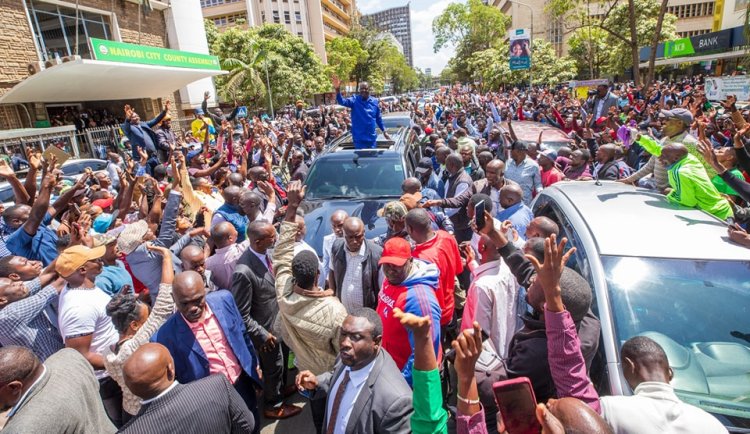Raila Cancels Migori Tour After Outbreak Of Deadly Disease
The opposition leader was set to tour the region on Saturday, August 6 and engage with political leaders as well as address the residents during rallies.

Azimio la Umoja leader, Raila Odinga on Friday, August 5 cancelled his planned tour of Migori County.
The opposition leader was set to tour the region on Saturday, August 6 and engage with political leaders as well as address the residents during rallies.
Raila also intended to light a candle in the area in remembrance of those who lost their lives during the anti-government protests.
Orange Democratic Movement (ODM) Party Chairman in Migori Philip Makabongo confirmed the cancellation of the Migori tour, adding that it was occasioned by the outbreak of cholera in the region.

Raila Odinga greeting supporters in Nairobi CBD on July 10, 2023. /RAILA ODINGA
"Having large gatherings this time when the county has witnessed some cases of cholera might worsen the situation," Makabongo said.
The opposition side exercised caution after eight county residents tested positive for cholera and were admitted to Migori Referral Hospital.
The county is currently on high alert as Migori County Health Executive Julius Nyerere urged residents to maintain high standards of hygiene to avoid contracting the deadly disease.
Due to the cholera outbreak, there were concerns that holding large gatherings during Raila Odinga's visit could result in an increase in the number of positive cases.
During the protests staged in Migori, three people tragically lost their lives, while thirteen others sustained wounds. According to Azimio, nationwide casualties exceeded 50, though the accuracy of this data is yet to be verified by the police.
Cholera Signs & Symptoms
Cholera, according to the Centres For Disease Control and Prevention (CDC), is an acute diarrheal illness caused by infection of the intestine with Vibrio cholerae bacteria.
People can get sick when they swallow food or water contaminated with cholera bacteria. The infection is often mild or without symptoms, but can sometimes be severe and life-threatening.
About 1 in 10 people with cholera will experience severe symptoms, which, in the early stages, include profuse watery diarrhoea, sometimes described as “rice-water stools”, vomiting, thirst, leg cramps, restlessness or irritability.
Healthcare providers should look for signs of dehydration when examining a patient with profuse watery diarrhoea. These include: rapid heart rate, loss of skin elasticity, dry mucous membranes and low blood pressure
People with severe cholera can develop severe dehydration, which can lead to kidney failure. If left untreated, severe dehydration can lead to shock, coma, and death within hours.
The profuse diarrhoea produced by cholera patients contains large amounts of the infectious Vibrio cholerae germ that can infect others if swallowed. This can happen when the bacteria get on food or into water.
Prevention
To prevent the bacteria from spreading, all faeces (human waste) from sick persons should be thrown away carefully to ensure it does not contaminate anything nearby. People caring for cholera patients must wash their hands thoroughly after touching anything that might be contaminated with patients’ faeces (poop).
When cholera patients are treated quickly, they usually recover without long-term consequences. Cholera patients do not typically become carriers of the cholera bacteria after they recover, but they get sick if exposed again.


 admin
admin 




